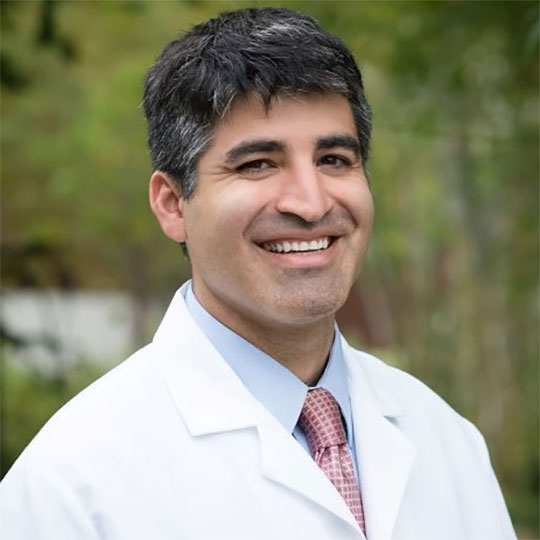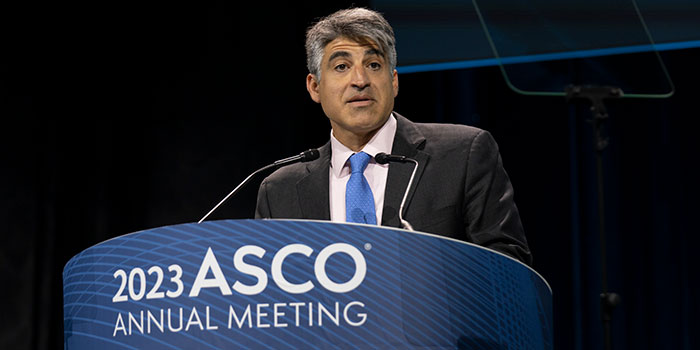


Alex Herrera, MD, has looked on his tumultuous childhood, a parade of doubters and an accident that nearly ended his career as opportunities to foster his own resilience.
Most Major League Baseball players can hit a 95-mph fastball. But one key skill that separates the best major leaguers from the benchwarmers is the ability to knock a curveball out of the park.
At some point in his young baseball life, Alex Herrera, MD, realized that playing professional baseball was not in his future. But the City of Hope Duarte physician has shown throughout the years that he knows how to handle life’s curveballs. From surviving a tumultuous childhood, to being told (wrongly) he’d never be an Ivy Leaguer to recovering from a horrific skiing accident that left him severely debilitated and almost ended his medical career, Dr. Herrera has taken the curveballs life has thrown at him and turned them into opportunities to foster his own resilience.
He has come to view life’s inevitable challenges as “just one string of lessons.”
“Understanding what you’re passionate about is important,” he says, adding that the lessons he has learned have given him insight into how to prioritize his passions to be a successful physician, parent and partner.
Alex Herrera was born in Miami to teenage parents who met when they were in high school.
His mother came to Miami from Cuba during Operation Peter Pan, a clandestine operation to evacuate children from communist Cuba to the United States. More than 14,000 unaccompanied children emigrated to the U.S. upon fears the communist government in Cuba was going to herd them into indoctrination camps. His mother was 8 when she arrived in Miami and was sent to a foster home. When Dr. Herrera was a boy, his mother worked as a cocktail waitress and, later, as a paralegal.
His father was a car salesman and a bartender at Miami’s notorious Mutiny Hotel, the legendary hotspot for cocaine kingpins whose activities inspired the move Scarface. His father had issues with alcohol use and his mother was later diagnosed with bipolar disorder, all of which contributed to a chaotic home environment, he says.
“My parents had a tumultuous relationship,” he says, remembering the verbal and sometimes physical abuse between them. “I was witness to a lot of tumult, but despite that, I still felt like a kid. I still had a childhood. I really consider myself lucky. We didn’t have a lot, but I did have a lot of love and attention. I always felt really cared for.”
His parents divorced when he was about 11. And after his father moved away and as his mother struggled with her mental health, Dr. Herrera eventually went to live with his uncle.
A talented baseball player, Dr. Herrera found refuge on the ballfield. “That was my happy space,” he told The ASCO Post. He excelled at baseball and consistently played on his league’s All-Star teams. But as he grew older, he realized that he didn’t have the resources the other players had to cultivate their skills, like participating in travel leagues and private coaching. He participated in several sports in high school but stopped playing baseball in his sophomore year.
“I didn’t have somebody in sports to show me the way,” he says.
He credits his uncle, however, with helping him shift his focus to academics. Young Alex had always been a good student and knew he would probably be the first person in his family to attend college, yet he was “drifting” through high school without a strong sense of purpose. His uncle treated him to a college tour of Ivy League schools, which opened his eyes to new possibilities.
“He saw that education was a way forward and a way to opportunity,” Dr. Herrera says. “I’m forever thankful to him for that because I’d be in a completely different place if I hadn’t had that guidance.”
Thanks to his uncle, Dr. Herrera set new and higher expectations for himself. Others, however, were less than supportive.
“I had some early hard knocks [that taught me] how to be resilient — my childhood and maybe people not believing in me,” he says.
After the road trip with his uncle, Dr. Herrera set his sights on attending an Ivy League school. But his high school college counselor doubted he would be accepted.
“During my senior year in high school, I told my guidance counselor that my uncle encouraged me to aim high, so I was going to apply to Princeton University,” Dr. Herrera says in The ASCO Post. “He tried to dissuade me because no one from my high school had been accepted to Princeton in 40 years.”
He applied for Princeton and was accepted.
“I was motivated by people telling me I couldn’t do something and so I wanted to prove that I could,” he says.
He entered Princeton as a history major, but soon found he loved his pre-med courses more than other subjects, and that’s where he ultimately received his undergraduate degree. It was also at Princeton where he met his wife Naomi.
When he was pondering medical schools, a similar scenario played out. To hedge his bets, he applied to 20 medical schools, but his first choice was Harvard.
“The counselor sort of looked down her nose and told me it would be wise to readjust my expectations and pursue a more realistic path,” he said. “I was frustrated, to say the least, but I applied to Harvard Medical School and was accepted.”
Diagnosed with non-Hodgkin lymphoma in 2019, Amanda Salas, news anchor and personality on FOX11 in Los Angeles, is currently in remission and credits her recovery to Dr. Herrera.
“He will forever remain in my heart,” she says in a cityofhope.org Breakthroughs blog. “I’m standing here talking to you because of Dr. Herrera.”
In this video, Salas and Dr. Hererra discuss her diagnosis and treatment and the importance of family in a patient’s cancer journey.
Between graduating from college and beginning medical school, Dr. Herrera landed an opportunity to do research with acclaimed Breast Surgeon and Oncologist, Dr. Laura Esserman, at the University of California, San Francisco.
This “fantastic experience” piqued his interest in oncology even before he started medical school. That interest solidified as a third-year medical student when, as part of a special program at Harvard, he happened to be paired with a patient with ovarian cancer, with whom he developed a strong connection. He attended her surgery, went to her chemotherapy appointments and visited her at home where he met her family.
“It really showed me the role a provider can play; the trust you build in that [patient] relationship,” he says. “It was the thing that clinched my interest in oncology. It was really a special experience.”
After medical school and residency, Dr. Herrera was doing a fellowship at the Dana Farber Cancer Institute in Boston, and traveling back and forth to Los Angeles, where his wife was working as an oceanography professor at the University of Southern California and caring for their first child. Every time he got on the plane to go back to Boston, his heart broke, he remembers, and this is when he gained another valuable insight into what drives him.
Since those early days in high school, he had been on a path driven by achievement, but he began to see that academic and professional achievement cannot be the only motivator to a healthy and fulfilling life.
“When you retire you can’t have dinner with your grants and manuscripts and all the things you’ve achieved in life,” he says. “It’s your relationships and your family and your friends — the people who you have touched and interacted with in your life that’s important.”
He accepted a job at City of Hope in Southern California, where he was able to be with his family, and also pursue his research into cancer immunotherapies.

Just as his personal, family and professional lives were humming along, in 2019, another curve ball was thrown his way. Dr. Herrera was skiing and swerved to avoid a fallen skier, slamming into an ice wall and, despite wearing a helmet, he hit his temple and suffered a concussion.
But he had a rigorous clinical schedule, research responsibilities and international speaking engagements to keep. He didn’t let up on any of it, even though he knew that he needed to give his concussion time to heal.
“All my life I just operated under the guiding principle that if I just work hard enough I can make everything all right,” he says. “That doesn’t work when you’ve had a concussion.”
As he pushed himself to fulfill all his obligations, flying to Italy to speak at a conference and maintaining his usual grueling schedule, his body reacted. Suddenly he couldn’t stand bright lights and loud noises, all part of a post-concussive syndrome. He had, in effect, overloaded his senses. To function at all, he needed to confine himself to a dark, quiet space. In December 2019 he reluctantly took a medical leave to attend to the physiological and psychological impact of his unhealed head injury.
“It was completely devastating,” he says. “I didn’t know if I could work again or be a dad the way I wanted to be.”
Over time, working with a neurologist, psychiatrist, and physical and occupational therapists, Dr. Herrera was able to heal and return to work.
The experience offered him a fresh perspective on his personal priorities and passions. And it made him a better doctor, he says.
Today, Dr. Herrera is an Associate Professor of Medicine and Chief of the Division of Lymphoma and the Department of Hematology & Hematopoietic Cell Transplantation at City of Hope. At the 2023 American Society of Clinical Oncology (ASCO) annual meeting Dr. Herrera was among the most popular speakers and presented in the Plenary Session about his clinical trial for a new treatment for patients with advanced classic Hodgkin lymphoma.
“I really have this deep sense of commitment to other people and to my patients,” he says. “I feel a deep sense of responsibility about that. But I also really love what I do. It's a huge privilege to be able to design research and the trials that are going to define how we treat cancer.”
He’s also a husband, the father of two boys and a coach on their baseball teams. His injury and recovery have taught him to accept help, and that just gritting your teeth and pushing ahead isn’t always the best approach.
“I really have a hard time letting people down,” he says. “My wife reminds me that there are things in our life that we have to deal with and prioritize, and you can ask other people for help.
“Now I make time and prioritize the things I think are important,” he says. “I wouldn’t have done that before.”